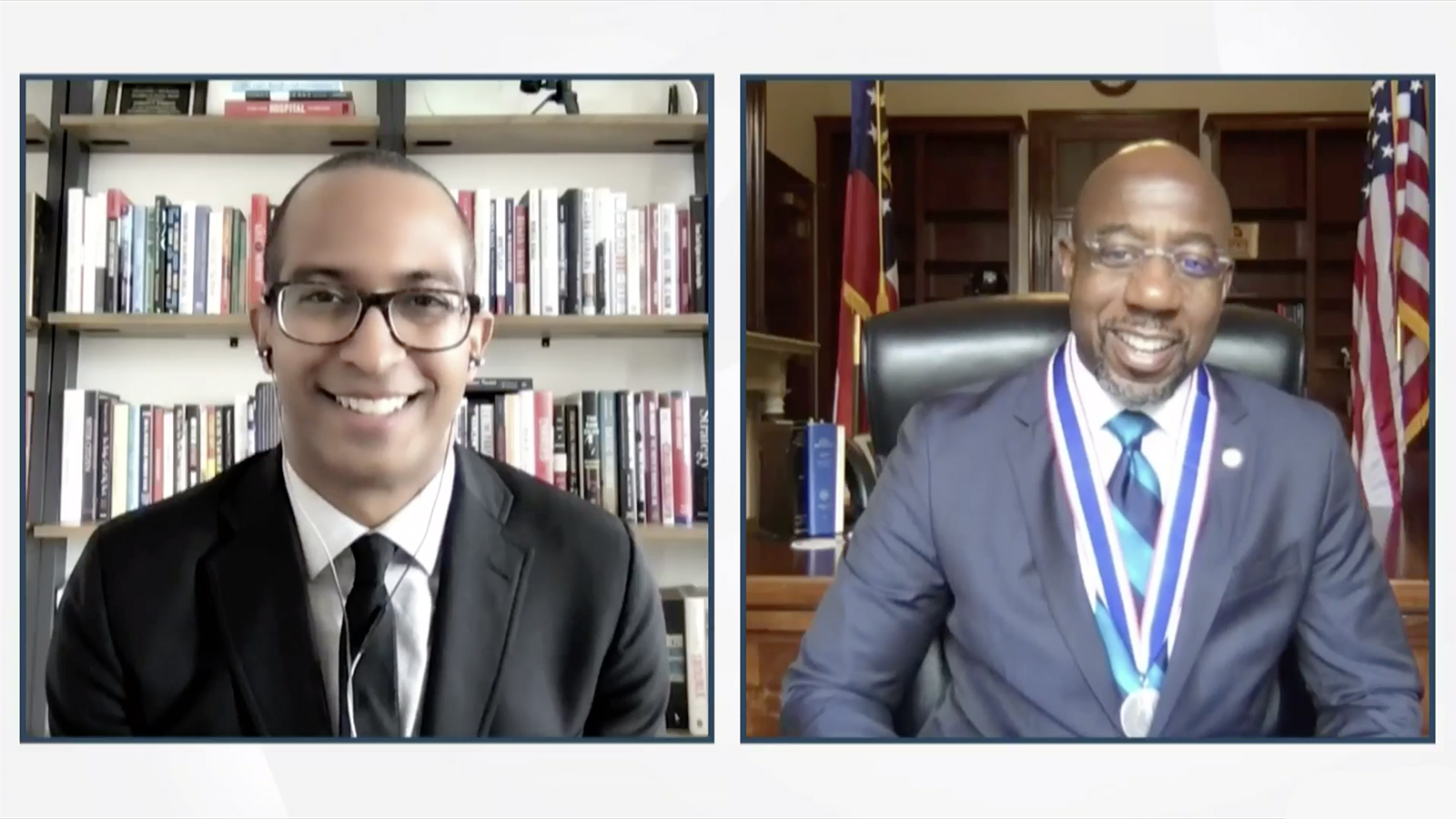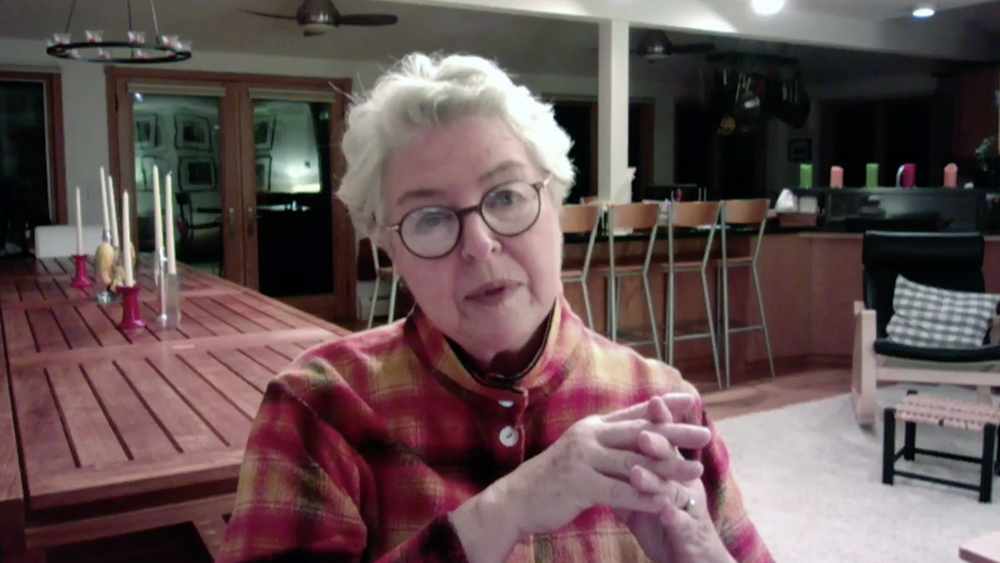by Adelle M. Banks, RNS | Nov 2, 2021 | Headline News |
(RNS) — Sen. Raphael Warnock, who continues to pastor his historic Atlanta church while serving as Georgia’s first Black U.S. senator, has received the Roosevelt Institute’s Freedom of Worship Award in a ceremony focused on racial justice.
“I really felt that the strength of his pastoral voice was unique,” Anne Roosevelt, granddaughter of President Franklin Delano Roosevelt and board chair of the institute, told Religion News Service hours before Warnock was honored in a Wednesday (Oct. 13) ceremony.
“And now, he’s in this new role in addition to his role as pastor at the church, but his voice is consistently counseling, teaching, making himself vulnerable in order to help the rest of us make sense of the world,” she said.
Warnock, the pastor of Ebenezer Baptist Church, where the Rev. Martin Luther King Jr. was once co-pastor, was honored on the same evening with New York Times journalist Nikole Hannah-Jones. She was awarded the institute’s Freedom of Speech and Expression Award after spearheading the newspaper’s 1619 Project that explored the history and legacy of slavery in the U.S.
The senator, interviewed during the virtual ceremony by Community Change President Dorian Warren, said he views himself as a “pastor in the Senate,” reminding the powerful not to ignore people with no wealth.

Dorian Warren, left, interviews Sen. Raphael Warnock during the Roosevelt Institute’s Four Freedoms Awards, Wednesday, Oct. 13, 2021, in a virtual ceremony. Video screengrab
“For me, faith gets engaged in the messiness of worldly struggle; it’s not hidden behind stained-glass windows,” Warnock said. “You probably could step over (the poor) but you shouldn’t. God warns us not to do that. My work is putting them always at the center. Because in their faces we see the face of God.”
The respective names of the Four Freedoms Awards are taken from fundamental liberties laid out in a 1941 speech to Congress by Franklin D. Roosevelt, who was elected to four terms in the Oval Office. He spoke of the “freedom of every person to worship God in his own way — everywhere in the world.”
His granddaughter, 73, said the institute, which has published reports and fact sheets on racial inequities, chose to take an “extra step” toward racial justice through this year’s awards.
“This is one event where we could say, ‘So what does it mean to be an anti-racist giver of awards?’” she said. “And to challenge ourselves and bring it to our own consciousness.”

Anne Roosevelt opens the Roosevelt Institute’s Four Freedoms Awards virtual ceremony, Wednesday, Oct. 13, 2021. Video screengrab
Anne Roosevelt acknowledged that African Americans and other people of color were often left out of her grandfather’s New Deal reforms.
“We are still falling short of making sure that we deliver the same benefits of our democracy to every person in our country,” she said.
While Anne Roosevelt’s grandfather and grandmother, Eleanor Roosevelt, were lifelong Episcopalians, she said she was raised Catholic and is not currently affiliated with a denomination. But as a member of the committee that nominated Warnock for his award, she said she appreciates him as a leader and as a person of faith.
“I don’t often reflect on Jesus, but when I do, I picture him being surrounded by the people who followed him,” she said. “He taught them how to live, how to live as the fullest and best expression of humanity. And I feel like Senator Warnock is in that mode.”
by Wil LaVeist | Jun 26, 2012 | Feature, Headline News |

ACQUITTED SINNER: Former Sen. John Edwards and family last month outside the federal courthouse in Greensboro, North Carolina, where he was found not guilty on one of six counts of campaign corruption. The judge ruled a mistrial on the other five. (Photo: Chucky Liddy/Newscom)
The campaign-corruption trial of former U.S. Sen. John Edwards is history now. His former mistress, Rielle Hunter, with whom he had a daughter, is now on tour promoting her memoir, What Really Happened: John Edwards, Our Daughter, and Me. She announced during a TV interview that she and Edwards are no longer a couple, but will continue raising their daughter together. Soon, both will be out of the news cycle, but their saga possibly offers a lasting lesson for many Christians concerning this question about sin and crime.
A jury found Edwards, an admitted sinner, not guilty on one count that he accepted illegal campaign contributions in order to hide his adulteress affair. The jury deadlocked on five other similar counts. The acquittal hasn’t totally exonerated Edwards of campaign finance crimes, but the U.S. State Department dropped the case anyway.
Edward’s sin with Hunter occurred while he was campaigning for the presidency of the United States and while his late wife, Elizabeth, was dying of cancer. Like many men (and women) caught in an immoral self-inflicted bind, Edwards lied and lied until the truth, as it always does, eventually came to light. Many people who paid attention to the case agree that Edwards was put on trial more so as punshment for being unfaithful to his dying wife and for his hubris to believe he could sneak his secret into the White House.
And so Edwards publicly confessed his sins (which the Bible, in 1 John 1:9, states will be forgiven) before God and the world. However, should the government criminalize a sin that basically affects only the imperfect consenting adults involved? Should the church get riled about certain sins, while giving a pass to others?
I’ve been wondering about this most recently since President Obama announced in a TV interview in May that he supports same-sex marriage. The president caused an uproar among many Christians that still simmers, including among many of his supporters in the black church. But should the government, under political pressure from the church, legislate against same-sex marriage, especially when in America two consenting heterosexual adults can marry and divorce without the church being involved? Should most Christians insist that same-sex marriage be illegal, when homosexuality is actually listed in the Bible equally among other sexual sins, including adultery, that are not federal crimes?
A sin is a transgression against divine law for which Christians believe the sinner will be accountable at the judgment seat. The sinner mainly puts him or herself at risk with God. A crime is an action against the people that injures the “public welfare.” Like a drunk driver who runs a stop sign, or an armed robber, committing a crime puts several innocent people potentially at great risk. The government, working on behalf of the people, therefore has a duty to prevent crimes and punish criminals. Does the same duty apply to non-felonious sins?
Obviously many sins are also crimes such as, for example, being a serial killer. But what injury does same-sex marriage between two consenting adults cause to the public welfare? Is it more severe than adultery? Is it more destructive than divorce, a sin that often tears families and wounds innocent children? God allows divorce (which should be a last resort when reconciliation fails) under certain circumstances. Neither adultery nor divorces are federal crimes. Thankfully America is a democracy — a nation of Christians, believers of other faiths, agnostics and atheists, who for the most part believe in preserving the separation of church and state, and not a theocracy, as in living under Sharia law.
A recent CNN/ORC poll indicates that the majority of Americans believe same-sex marriage should be legal. Perhaps they’re saying it should be treated like adultery or divorce; it may be wrong, but people deserve the free-will right to choose who they want to (or don’t want to) be in a committed personal relationship with.
During closing remarks, Edwards’ attorney Abbe Lowell reportedly told the jury, “This is a case that should define the difference between a wrong and a crime … between a sin and a felony. John Edwards has confessed his sins. He will serve a life sentence for those.”
Perhaps Christians who are adamantly against two consenting same-sex adults having the legal right to marry should adopt this reasoning, too.



